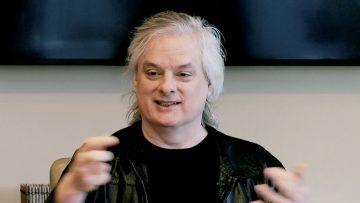David Chalmers in Edge:
 We’ve got these bodies and these brains, which work okay, but we also have minds. We see, we hear, we think, we feel, we plan, we act, we do; we’re conscious. Viewed from the outside, you see a reasonably finely tuned mechanism. From the inside, we all experience ourselves as having a mind, as feeling, thinking, experiencing, being, which is pretty central to our conception of ourselves. It also raises any number of philosophical and scientific problems. When it comes to explaining the objective stuff from the outside—the behavior and so on—you put together some neural and computational mechanisms, and we have a paradigm for explaining those.
We’ve got these bodies and these brains, which work okay, but we also have minds. We see, we hear, we think, we feel, we plan, we act, we do; we’re conscious. Viewed from the outside, you see a reasonably finely tuned mechanism. From the inside, we all experience ourselves as having a mind, as feeling, thinking, experiencing, being, which is pretty central to our conception of ourselves. It also raises any number of philosophical and scientific problems. When it comes to explaining the objective stuff from the outside—the behavior and so on—you put together some neural and computational mechanisms, and we have a paradigm for explaining those.
When it comes to explaining the mind, particularly the conscious aspects of the mind, it looks like the standard paradigm of putting together mechanisms and explaining things like the objective processes of behavior leaves an explanatory gap. How does all that processing give you a subjective experience, and why does it feel like something from the inside doesn’t look like it’s directly addressed by these methods? That’s what people call the hard problem of consciousness, as opposed to, say, the easy problems of explaining behavior.
Discussion can then spin off in a thousand directions. Could you explain conscious experience in terms of the brain? Does it require something fundamentally new? Does it exist at all? Lately, I’ve been interested in coming at this from a slightly different direction. We’ve got the first-order problem of consciousness, and then it’s often hard for people from AI research, or neuroscience, or psychology to say, “There’s a problem here, but I’m not quite sure what I can do with it.”
More here.
